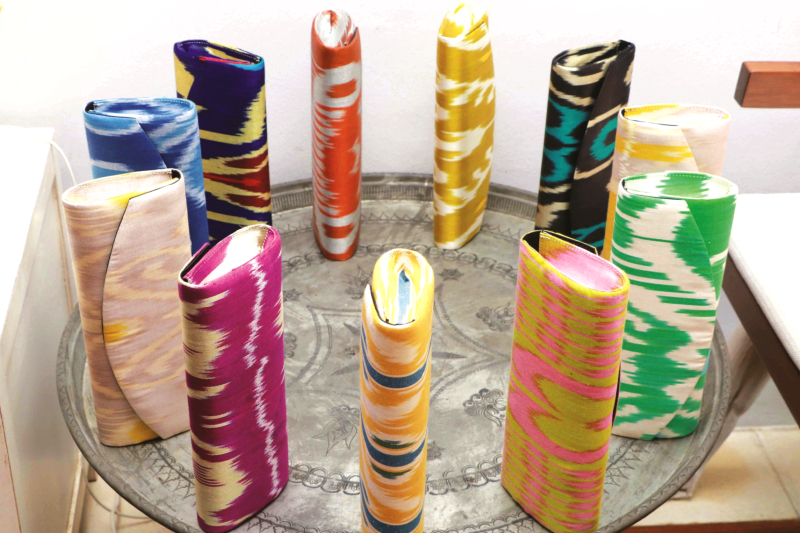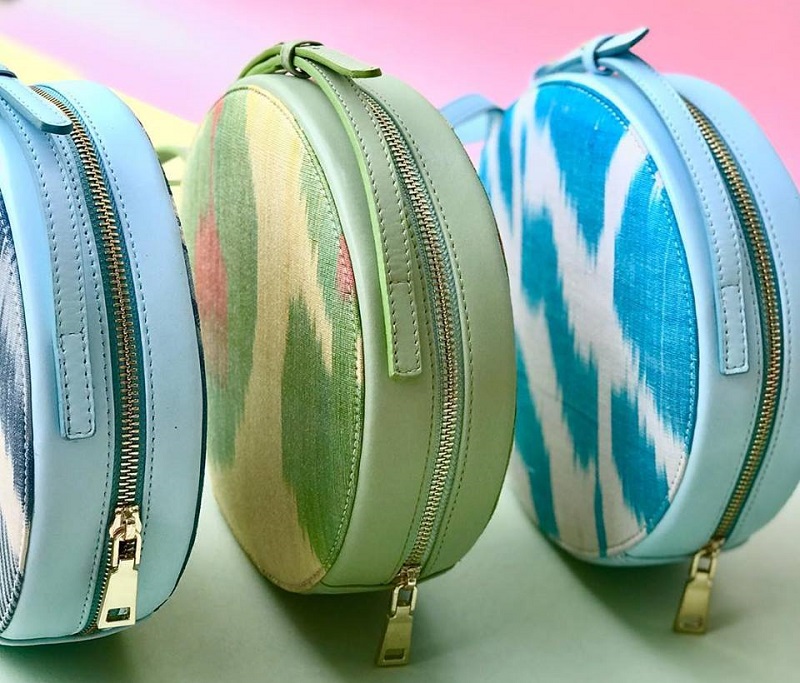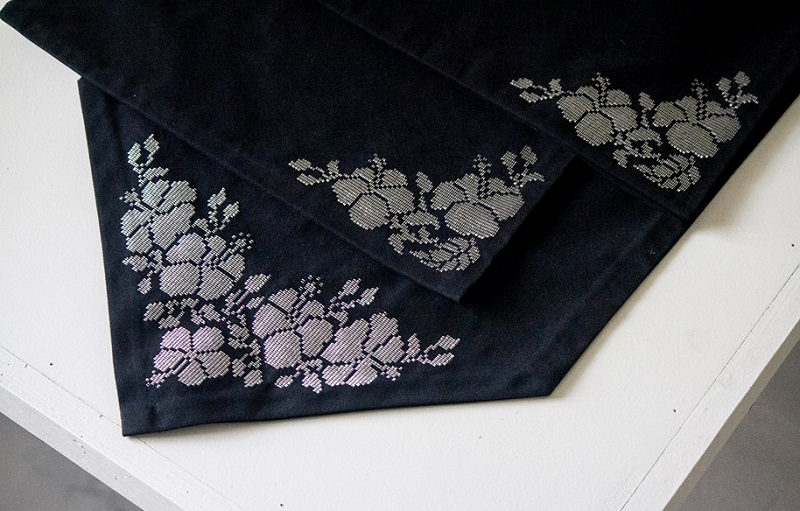
Although its history is truly compelling, it is the modern applications of Uzbek ikat that appealed to Turner (Photo: Haris Hassan/The Edge)
In the local accessories landscape, Frankitas has always stood out for its unmistakable aesthetic — bags and clutches in practical shapes, utilising traditionally woven fabrics in bold colours. The brand’s Webe and Travel bags are made with Rang Rang fabric from Indonesia, while the bulk of its handheld clutches and evening bags feature boldly coloured ikat silk fabric from Uzbekistan.
“It is, by far, the best ikat there is,” Frankitas’ founder Francisca Turner says about Uzbek ikat. “Weavers still use ancient, traditional techniques and bold, beautiful motifs. There is no heavy machinery used, and all-natural dyes with no chemicals — this makes it the most environmentally friendly fabric in the world because the waste is biodegradable. Making ikat fabric in Uzbekistan is a 9 to 12 step process, which weavers there still adhere to. If you’re talking about handwoven fabric, it’s really very intricate.”
pro_frankitas_5_hh_copy.jpg

A weaving style common to many world cultures, ikat is probably one of the oldest forms of textile decoration. As textiles do not last well through history, scholars have so far been unable to determine where the technique of ikat originated. Nevertheless, some parts of Asia demonstrate strong ikat traditions that suggest its possible origin — Maritime Southeast Asia, the Indian subcontinent and Central Asia — although it also exists in several South American cultures as well.
In the 17th century, ikat robes were a royal prerogative of Uzbek rulers and their families. With the dawn of the Russian revolution, the new government set about standardising Uzbek culture to fit its new Soviet ideals. Uzbek ikat became more commonplace, its production shifting from workshops run by masters with apprentices to factory production in a cooperative. Things began to change in the 1990s, and the making of ikat fabric has returned to traditional workshops, with hand binding, dyeing and weaving silk ikat an important part of the forging of an independent Uzbek identity.
Although its history is truly compelling, it is the modern applications of Uzbek ikat that appealed to Turner, whose brand ethos has always been anchored on fair trade and sustainable sourcing. “All my fabric is obtained this way,” she says.
53152886_2156798071026239_107632009286778880_n.jpg

Because of the rich history and national importance of this fabric, Frankitas’ wildly popular ikat bags eventually attracted the attention of the Uzbek ambassador to Malaysia, Ravshan Usmanov, who even paid a visit to the brand’s gallery in Bukit Damansara. “That was a huge surprise! We would have to usually go to the embassy, but this time, the ambassador was happy to come to our gallery and it was such a treat,” Turner says. “He was so pleased and proud for the way we were promoting Uzbek ikat, as he felt that this is something the embassy should be doing.”
Usmanov’s visit was no mere courtesy call, however, and followed through on his praise for Frankitas by inviting the brand to participate in Uzbekistan’s National Day celebration on Sept 5. Held at JW Marriott, the event paid homage to the Central Asian nation’s cultural heritage, which included a showcase by designer Shoxida Muxitdinova, whose work reflects the culture, history and traditions of the Uzbek people. Frankitas — a portmanteau of Turner’s name and tas, the Indonesian word for bag — was the only Malaysian brand invited to participate in the event.
It is the first of many more collaborations with the embassy, Turner says excitedly. “I can’t unveil too many details at present, but we are definitely working on a lot more activities in the future with the goal of raising the profile of this beautiful fabric and the talented men and women who make it in Uzbekistan. I think they don’t realise the treasure that they’ve got with their ikat, and I hope that I am able to communicate the values of this beautiful fabric.”
Turner has partnered a supplier in Uzbekistan who works directly with individual weavers, which allows her to be aware of the entire supply chain. The collaboration with the Uzbek embassy will undoubtedly allow her access to other weavers, but she is treading lightly in this regard. “We have a great relationship with our partner now in Uzbekistan,” she says. “But if there is an opportunity to work with other weavers in other parts of the country, and if it lets us help that particular community, then yes we are happy to be part of it.”
In order to expand Frankitas’ ikat offerings, Turner has started working with weavers in Cambodia on a new collection of bags, and come November, will debut an apparel collection designed together with Niki Dowlani, founder of resortwear label Owl by Dowlani. The focus on Uzbek ikat will continue, however, in the light of the relationship Turner has cultivated with the embassy, and is making plans to visit Uzbekistan to explore future possibilities. A huge fan of Sarawak-based boutique songket atelier Tanoti and its community-driven initiatives, Turner also hopes to one day collaborate with them as well, “although I don’t know if I could ever bring myself to cut into any of that gorgeous songket fabric,” she laughs.
12004796_936860219718852_6615771154921942608_n.jpg

In today’s challenging retail environment, pushing the agenda of fair trade and sustainable production methods has worked well for Frankitas, even though bottom lines have never been the motivating factor for Turner to do it. “This has always been something that’s very important to me,” she says. “As a woman entrepreneur and a mother, being able to give back to the women I work with is a major consideration and part of the Frankitas brand ethos. Right now, it has become cool and desirable, but for me it has always been important and a major part of why I do this.”
Frankitas’ unabashedly ethnic inspirations have also set it apart from competitors, including in markets outside Malaysia like Singapore, Japan, Spain and in many cities in the US. The partnership with the Uzbek embassy comes at an opportune time for Frankitas, which is now ready to take on international markets after serving local customers for five successful years.
“We notice many abandoned shopping carts on our website from US-based buyers because the price of shipping was just too high, which put them off making any purchases. To that end, we are establishing a stock centre with a partner in North Carolina to serve this market — that’s a huge step forward for us,” she says.
“And after a long time of working on my own, we are also now open to investors so we can really move the business forward in the next few years. This brand has been growing organically for a while now and I’ve always been resisting the idea of investors because I haven’t been ready, but I do think the time is ripe to take the next big step with a partner who believes in the causes and goals that we do.”
This article first appeared on Sept 16, 2019 in The Edge Malaysia.


